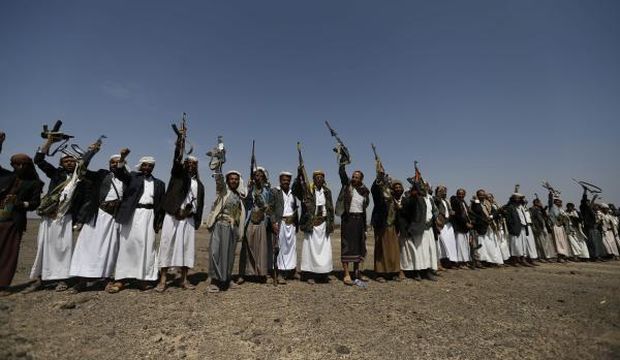
Followers of the Shi’ite Muslim Houthi group shout slogans as they attend an anti-government gathering in Arhab, north of Yemen’s capital Sana’a, on August 17, 2014. (Reuters/Khaled Abdullah)
Sana’a, Asharq Al-Awsat—Clashes continued between the military and Al-Qaeda insurgents in Yemen’s southern Hadhramaut governorate over the weekend, as Houthi rebels called for public demonstrations against the government.
The Yemeni security forces have launched a campaign to regain control of the province in recent weeks, after it became clear that Al-Qaeda in the Arabian Peninsula (AQAP) had been able to take control of large swaths of the area.
A Yemeni military source said several members of Al-Qaeda had been killed in a military operation in the town of Al-Qatn, in the Hadhramaut governorate, on Sunday.
The source said: “The army attacked a terrorist group in Al-Qatn and killed four terrorists and arrested five others.” He added that one soldier was killed and five were injured in the operation.
Meanwhile, the security situation in the rest of the country, including the capital Sana’a, remained poor, with a growing number of assassination attempts of officials and public figures, including a failed attempt on the life of the head of security in the city on Sunday.
On the same day, the Yemeni Union of Journalists and the Ministry of Information condemned recent attacks on journalists. Abdul-Rahman Hamid Al-Din, a broadcaster at the state radio in Sana’a, was killed, and an attempt was made to assassinate television director Ibrahim Al-Abyad.
Marwan Dammaj, secretary-general of the Journalists’ Union, told Asharq Al-Awsat that “the media is very worried about the assassination of a radio broadcaster and the targeting of a TV director, and the security services must reveal who is behind these assassination attempts.”
The Yemeni Interior Ministry also announced on Sunday the tightening of security measures around Sana’a following calls by Houthi rebels for sit-ins in the capital.
Over the weekend, members of the Houthi rebel movement began to gather in the Yemeni capital calling for the toppling of the government and the restoration of fuel subsidies.
The calls from the Houthis are the latest in a string of major public protests against the lifting of fuel subsidies, itself part of a controversial economic reform package recently introduced by the Yemeni government.
A member of the Houthis’ Political Council, Ali Al-Bakhiti, told Asharq Al-Awsat that the aim of the protests was to topple the government and reverse the price rises, and that sit-in camps had been built around the capital, as well as in Saada and Amran, and other areas.
He added: “They are peaceful protests, but their future options are left to circumstance and we will not announce them.”
He also insisted that the protests would remain peaceful.
Meanwhile, the UN secretary-general’s special envoy to Yemen, Jamal Benomar, returned to Sana’a two weeks before he is due to report to the Security Council on the state of Yemen’s political transition.
Benomar’s visit follows on the heels of a trip to the country by the Security Council’s Yemen sanctions committee to investigate allegations against individuals accused of attempting to destabilize the country.
Sources told Asharq Al-Awsat that the committee has identified a number of people on Yemen’s political scene, as well as tribal leaders and businessmen, it suspects of attempting to hinder the country’s political transition.
Under Security Council Resolution 2140, the committee has the power to freeze assets belonging to and impose travel bans on individuals or entities “obstructing or undermining the successful completion of the political transition” in Yemen.
The country is attempting to reform its political system in the wake of the resignation of former president Ali Abdullah Saleh, who stood down in the face of mass protests in 2011.
